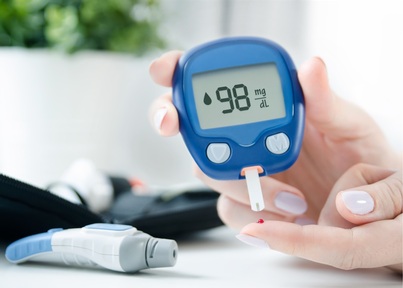Diabetes will be the next epidemic with Covid being the cause, warn experts
By 2030, up to 17 million people or one-in-three UK adults could have an increased risk of developing Type 2 diabetes, not only with the rising levels of obesity but there is new evidence Covid-19 may also be triggering new cases, warns London Medical Laboratory.

According to Dr Quinton Fivelman, chief scientific officer at London Medical Laboratory, diabetes is “escalating rapidly” in the UK population and is usually linked to factors such as weight, lifestyle, age and family history.
But in the last year, he believes there could be a link with Covid-19 which could be triggering the disease in previously healthy people, and potentially significantly worsening cases for some pre-existing diabetics.
Dr Fivelman said: “The way Covid-19 penetrates organs is a particular concern. The virus interacts with a receptor called ACE-2 to infiltrate cells in organs, including the pancreas. It is likely that this disrupts sugar metabolism. The virus can spread beyond patient’s respiratory tract and lungs.”
Two US studies released this summer, from Weill Cornell Medicine and Stanford University School of Medicine, show Covid-19 in pancreatic cells from patients who died from Covid-19.
Additional experiments revealed Covid-19 selectively infected human islet cells in laboratory experiments. This suggests Covid-19 infection of the pancreatic cells can, in some cases, lead to diabetes similar to Type 1 diabetes in previously healthy patients.
Dr Fivelman added: “Put simply, diabetes is a disease in which people’s blood sugar levels become too high. If not treated quickly, it can lead to heart attacks, kidney failure, strokes, amputation, and blindness.”
“Keeping your blood sugar levels normal requires the proper balance of glucagon and insulin secretion at the appropriate times. A lack of insulin secretion can result in Type 1 diabetes. This may be triggered by Covid-19 attacking pancreatic cells.”
To avoid the risk of Covid-19 and diabetes comorbidity, Dr Fivelman suggests keeping up to date with Covid vaccinations, eat healthily to encourage weight loss, drink within the government alcohol guidelines and continue to avoid crowded areas such as nightclubs.
'We’re at the tipping point of a public health emergency'
Additional analysis carried out by Diabetes UK show up to 17 million people or one-in-three UK adults, could be at an increased risk of developing type 2 diabetes by 2030, unless there is commitment from the governments of the UK to urgently invest in diabetes care and prevention.
Their prediction is based on analysis of statistics from Public Health England and The Association of Public Health Observatories.
Diabetes UK is calling on the government to make more funding available to give people preventative measures to avoid a diagnosis of type 2 diabetes such as the NHS Diabetes Prevention Programme as well as support people diagnosed with type 2 diabetes go into remission where possible through weight loss programmes.
Diabetes UK chief executive Chris Askew said: “It’s a sobering thought if we don’t act today, hundreds of thousands more will face the life-changing news that they have type 2 diabetes. We’re at the tipping point of a public health emergency and need action today to stop it in its tracks.
“We don’t want our prediction to become a reality. What we need to see is the will, grit and determination from government to halt this crisis in its tracks and improve the future health of our nation for generations to come."
Latest News
 29-Jul-24
Dementia Bus gives carehome.co.uk staff insight into life with dementia
29-Jul-24
Dementia Bus gives carehome.co.uk staff insight into life with dementia
 27-Jul-23
UK's top home care agencies in 2023 revealed
27-Jul-23
UK's top home care agencies in 2023 revealed
 30-Nov-22
A quarter of older people keep their falls secret from family
30-Nov-22
A quarter of older people keep their falls secret from family
 29-Nov-22
'Covid-19 has not gone away' say terminally ill
29-Nov-22
'Covid-19 has not gone away' say terminally ill
 28-Nov-22
IT consultant who received poor care opens 'compassionate' home care business
28-Nov-22
IT consultant who received poor care opens 'compassionate' home care business